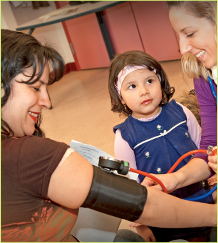Find out how Progreso Latino is helping increase access to healthcare services and education.
As we journey further into the 21st century, America still struggles to ensure everyone in the country receives equitable healthcare. Recent releases of the National Healthcare Disparities Report (NHDR) reveal significant differences in healthcare access and quality related to race and ethnicity. Consider this from the 2009 NHDR: The rate of new AIDS cases for Blacks in 2007 was nearly 10 times higher than for Whites. And this from the Office of Minority Health: Hispanics are twice as likely to die from viral hepatitis as compared to Whites. Statistics like these are easy to find.
A wide range of causes combine to make this a complex problem. Lack of health insurance, lower incomes, language barriers, cultural differences, and discrimination are just a few. Across the country, organizations large and small are working to correct the problem, or at least alleviate it. Progreso Latino in Central Falls, Rhode Island, is one of those organizations.
Reaching out
Progreso Latino is a multicultural social service agency that serves a diverse Latino population, as well as immigrants and refugees of other European, African, and Asian nationalities. In addition to providing a wide range of social, immigration, and educational services, Progreso Latino operates a wellness center to help improve the health of underserved individuals in its community. One strategy the wellness center has used successfully is to team up with local healthcare organizations such as Blue Cross & Blue Shield of Rhode Island, Lifespan, and Women & Infants Hospital to conduct health fairs.
"We have done some amazing health fairs that attracted hundreds of people," says Vinnie Velazquez, Wellness Consultant for Progreso Latino. Through the fairs, they have screened people for high cholesterol, diabetes, high blood pressure, and prostate cancer; provided flu and hepatitis vaccinations; and offered HIV testing and eye exams. It's clear Progreso Latino is a vital lifeline to health services that the community might not be able to get elsewhere.
A personal touch
In addition to assisting at the health fairs, the wellness center staff members perform a number of other valuable services, such as helping community members apply for medical insurance and obtain free or low-cost medical services. They provide health education, gather health information, make referrals, and translate when necessary. They help people with diabetes monitor their condition, and even give community members a hand putting questions together in preparation for a doctor's visit. This is particularly helpful when language or health literacy is an issue.
Spreading the word
Just as important as providing health services is creating awareness that the services are available. Vinnie says preventive healthcare like the type Progreso Latino helps provide is a foreign concept for many Latinos. It's not commonly practiced in their homelands and is something they need to be educated about. Too often, they treat health problems with home remedies and wait too long to get care. So Vinnie and the wellness center staff work hard to get the word out.
"Community outreach is the heart and soul of this program," Vinnie says. "We've done press releases, we've done e-mail blasts. We've talked to business owners and taken flyers into businesses. They'll say to us, 'I didn't know you guys have free screenings. I don't have insurance. My mother has this, my uncle has that.' It's amazing. It's a whole trickle-down effect that gets a lot of people coming in."
Making a difference
One person who came in was a man Vinnie refers to as "Juan." Juan attended a Progreso Latino health fair for men and was tested for HIV. The test came back positive. Back in 1998, Vinnie says, Juan tested positive for gonorrhea, a risk factor for HIV. When Vinnie asked him why he had waited so long to get tested for HIV, he said he didn't have insurance and he didn't know where to call or who to ask.
"The doctor said he probably had been HIV positive for about 10 years," Vinnie says, "which means that he possibly infected other people without knowing it."
Progreso Latino helped Juan get the proper care and provided him with much needed emotional support. In the future, Vinnie hopes the wellness center can reach people like Juan sooner so that they can take preventive action. The center strives to provide as many people as possible with the opportunity to get the health information and care they need. In the long run, committed community-based efforts like theirs will help make for a healthier America.





